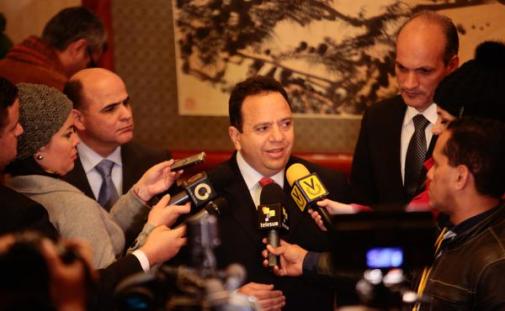
After postponing his “announcements” for a while due to his Magical Mystery Tour, President Maduro finally had time to come back to Venezuela and give his also twice postponed State of the Union address, where we were supposed to hear his new “program” for the economy. In the end, there were few details on what he plans to do with the foreign exchange, while very specific plans to spend even more.
Maduro announced that he would keep a three tier foreign exchange system (Four if you include the black market, which will not necessarily disappear). This is clearly a negative, as it has failed over and over again, but Chavismo is stuck in this model. Here are the three parts of the new system:
-Food and medicines will be kept at Bs. 6.3 per US$. This is obviously a #FAIL, as the implicit exchange rate stands at Bs. 97 per US$ and the Government will devalue the other two rates to factors of even more than ten times this level, which opens up for corruption, arbitrage and smuggling to Colombia everything imported to Venezuela at this price.
-A second rate, lets call it Sicad, will merge the old Sicad 1 (Around Bs. 12 per US$) and Sicad 2 (Around Bs. 50 per US$) into a single auction mechanism. This is impossible to judge at this time. First, we don’t know the level, it could be Bs. 12, it could be Bs. 40 or whatever. Somehow, I think it will be closer to Bs. 12 than to Bs. 40, as President Maduro said yesterday that the oligarchy thought he was going to devalue to Bs. 40, but “he was driving them crazy”. Well, he is also driving himself deeply into a hole with his ignorance about these matters. In the end, for this rate, anything below Bs. 30-40 per US$ will do nothing to help in having more currency available overall, which should be the point of any new policy. Seems like a #FAIL, but until the Devil knows the details he will hold judgement and give the Government the benefit of the doubt.
-The final one, which got everyone excited is that the Government plans to have a legal parallel system in which the price will somewhat determined by the laws of supply and demand in which people, companies, brokers, the Public Bolsa can participate and supervised by the Governemnt.
Ummm, Where have I heard this before? Ahh! Yes! This is how Sicad 2 started, in the words of Rafael Ramirez, exactly one year ago and when implementation came around, it all became a Sitme-like system at a rate of Bs. 50 per US$ and subject to arbitrary criteria, unknown forces and preferential treatment. A waste of foreign currency in the end.
But let’s assume and suppose that it will be almost free, the Government will impose lots of rules and regulations. It will impose daily limits etc. Then, the current parallel market will not disappear, there will be four rates of exchange with the “Dolar Today” rate surviving. This would be a #FAIL.
Let us then assume that it will really be free, supply and demand, market forces and all of that. Will the current parallel exchange rate increase or decrease?
Here is what I think: Initially, just like when Sicad 2 was announced the rate will go down. Because people truly think (and argue) that in a free market it will go down.
First of all, it will take a while to set up this system. From what the Government has said, it will be a swap (permuta)-like system involving bonds . (What is this fixation with involving bonds, whatever happened to currency trading using currencies?) But it so happens that currently local brokers can not hold dollar denominated bonds. Thus, the Securities Law needs to be changed. Then, the Government has to decide how the market will function, hours, the like. This could take at least two or three months to be implemented. The parallel exchange rate is likely to move up as people lose patience.
Then the market starts and this is where I have a few doubts that it will go down. How much money does the Government have to supply this “free” market? Given the shortage of currency, I don’t believe it has much. Additionally, there are many multinationals, that have not purchased a single dollar in the illegal market since May 2010. There were others that were not even buying then in the innocent belief that they would get their dollars at Bs. 4.3 per US$. Most of them in the face of a free and legal exchange will decide to repatriate at least some of the Monopoly money they have in Venezuela today. That is a lot of Monopoly money even at Bs. 200 per US$.
People argue that the cash held by some companies becomes peanuts at Bs. 200. It may be so. But the cash held by many people and many companies, which have found it impossible to get their money out of the country for almost five years, can become a lot of money.
Let me give you an example: Suppose the Government decides to sell US$ 2 billion at Bs. 150 (They will surely try to push the parallel rate down) right off the bat to “cool” off the market. At that price, this only suctions out of the system only 15% of M2 (Monetary Liquidity which is 2 trillion Bolivars today). Will the Government have or want to use another US$ 2 billion to keep it down at that time?
I doubt it.
Thus, the rate will go up.
Thus, I am skeptical of how well it will work, more so since the Government has to provide lots of foreign currency at the other two lower rates. But, while this legal and free system may not help solving the problem of fewer dollars and may exacerbate other problems like inflation, I would welcome and approve this system. That’s the way it should always be. Ask the Swiss.
If they do implement it would be an incredible irony and inconsistency that Chavismo destroyed Venezuela’s Capital markets in 2010, blaming them for the rate being at Bs. 8 per US in May 2010 and will now try to replicate that system, when the parallel rate is now over TWENTY times higher. Of course, there is no remorse or apology to those whose lives were destroyed, those that were jailed and those that lost their jobs. For Chavismo, it is always somebody else’s fault
But Maduro still thinks that there is something “modern” about the system he is planning to implement and that there is nothing less modern than controls. I actually wonder if he has realized that if there is legal and free system, then anyone importing at that rate can increase prices proportionately. What ever happened to controlling prices too?
But multinationals are likely worrying already about taking the loss from Bs. 50 to the new parallel market. Ouch!
The rest of the announcements did have specifics: Maduro plans to spend like a bandit and gave many specifics of new programs that add up to a significant fraction (6-7%?) of GDP. Go figure.
Maduro did not mention a single number of all the funding that he claims he obtained in the trip.
And given that 90 days ago Venezuela’s oil basket was close to US$ 80 per barrel, I wonder if a new economic plan will be needed at the time, since today’s cash flow is coming from those barrels sold three months ago. In April, it will be at a price below US$ 40 per barrel. And appealing to Maduro’s own speech: If God does not provide, who will he call upon to help? The pajarito*?
*Little bird
 “The Armed Forces will have methods and means that will allow the equipment and permanent training of the military personnel for the progressive and differentiated use of force…and the use of force as situational punishment .
“The Armed Forces will have methods and means that will allow the equipment and permanent training of the military personnel for the progressive and differentiated use of force…and the use of force as situational punishment .

























